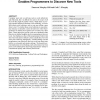787 search results - page 21 / 158 » Using Rough Sets as Tools for Knowledge Discovery |
98
Voted
DAGSTUHL
2004
15 years 1 months ago
2004
Subgroup discovery aims at finding interesting subsets of a classified example set that deviates from the overall distribution. The search is guided by a so-called utility function...
114
Voted
RSFDGRC
2005
Springer
15 years 5 months ago
2005
Springer
The paper concerns failing queries in incomplete Distributed Autonomous Information Systems (DAIS) based on attributes which are hierarchical and which semantics at different site...
101
click to vote
RSCTC
2000
Springer
15 years 4 months ago
2000
Springer
In this paper we introduce the concept of valued tolerance as an extension of the usual concept of indiscernibility (which is a crisp equivalence relation) in rough sets theory. So...
126
click to vote
IJAR
2006
15 years 11 days ago
2006
In spatial reasoning, in particular for applications in image understanding, structure recognition and computer vision, a lot of attention has to be paid to spatial relationships ...
121
click to vote
CSCW
2011
ACM
14 years 7 months ago
2011
ACM
Computer users rely on software tools to work effectively and efficiently, but it is difficult for users to be aware of all the tools that might be useful to them. While there a...

